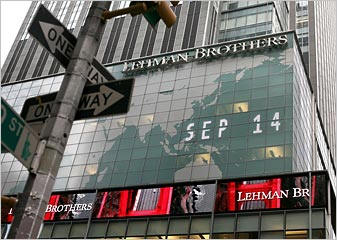|
|
 |
An
independent view of the world
seen from Tokelau
The Independent New York Times
Tokelau, Saturday,
October 11,
2008 Weekend Edition, editor
Sumpinein
- contact sumpinein@gmail.com
|
 |
|
|
|
|
Dow plunges
below 8,500 Stocks plunged in
the final minutes of trading Thursday, sending
the Dow Jones industrials down more than 600
points to their lowest level in five years after
a major credit ratings agency said it was
considering cutting its rating on General Motors
Corp. The Standard & Poor's 500 index fell more
than 6 percent. The selloff came as Standard &
Poor's Ratings Services put GM and its finance
affiliate GMAC LLC under review to see if its
rating should be cut. GM has been struggling
with weak car sales in North America. The action
means there is a 50 percent chance that S&P will
lower GM's and GMAC's ratings in the next three
months. General Motors Corp. led the Dow lower,
falling about 30 percent. The Dow fell more than
660 points, or 7.2 percent, to about 8,586 in
late dealings. The blue chips hadn't fallen
below the 9,000 level since Aug. 6, 2003.
The Standard & Poor's 500 index fell 74.73, or
7.6 percent, to 910.12 in late dealings.
Stocks Swung Wildly in Chaotic
Trading ending
at
8,452.23
on Friday's closing bell 1,600 points down on
the week |
|
 |
|
A UN study says that in financial
terms currently the loss of forest
equals some US$2- US$5 trillion every
year. Who is going to do something about
all this? Indonesian authorities have pledged
to stop the loss of forests and species
in Sumatra, one of the world's most
ecologically important islands.
Representatives of the island's 10
provinces, national government and the
environment group WWF launched the deal
at the World Conservation Congress.
Sumatra has lost about half of its
forest cover in the last 20 years. It is
home to a number of important and iconic
species such as the tiger, orangutan,
rhinoceros and elephant. The island has
suffered floods and forest fires in
recent years that have been widely
attributed to illegal forest clearance.
Two years ago, President Susilo Bambang
Yudhoyono was forced to apologise to
Singapore and Malaysia when smog from
burning Sumatran forest covered the
neighbouring countries. The need to deal
with these issues appears to have played
a big part in persuading the authorities
to act. "In the rainy months, we are
seeing landslides and flooding more
often, and it is time to make a real
change," said Indonesia's deputy
environment minister Hermien Roosita at
a news briefing here. "Every governor
from the 10 provinces and four
(national) ministries have signed this
monumental commitment to ecosystem
restoration of the island and protecting
the remaining natural forest." More than
13% of the island's forests lie on peat,
which contain vast amounts of carbon
that would be lost to the atmosphere if
the trees were removed, accelerating
climate change. "When you look at the
flora and fauna in this area and the
rate of loss that's going on, this is a
substantial commitment to protect and
restore forests," said Gordon Shepherd,
WWF's director of global policy. The
government has already regulated to stop
clearance of virgin forest for palm oil
plantations - grown for food, industry
and biofuels - but the government
acknowledges the ban may not be
completely effective . Good planning
As well as protecting and restoring
forest, the authorities have pledged to
make development on Sumatra obey
principles of "ecosystem-based
planning", where any projects
detrimental to the island's ecological
health would be banned.
However, the vice-governor of the province of West Sumatra,
Marlis Rahman, said help from the west
would be needed to help meet the
commitments. "We are calling on the
international community to support us in
implementing this commitment on the
ground and help us to find extra
livelihoods by protecting our forests,"
he said. Mr Rahman did not put a figure
on how much money might be needed,
although he said say technical help was
also part of the equation. |
|
|
John Francis Kinsella's novel, Borneo Pulp,
tells the story of how a group of
industrialists planned the destruction
of Borneo's rain forests in their race
for profits. |
|
|
|
|
|
WORLD FINANCE TAKES A
HUGE HIT |

|
Is California
too big to fail?
California Gov.
Arnold
Schwarzenegger
credit for being
the first to
stick his hand
out. Even before
the vote on the
$700 billion
bailout bill
last week, the
wily Terminator
of fiscal
discipline had a
letter on the
desk of Treasury
Secretary Henry
Paulson making
the case for a
$7 billion loan
to keep the
nation's most
populous state
running past
October. Arguing
that California
-- and many
other states --
have been frozen
out of the
credit markets
like a subprime
homebuyer,
Schwarzenegger
said the state
needs the money
to pay teachers,
cops,
firefighters,
nurses, and
other
state-funded
enterprises of
some importance.
California was
quickly followed
by
Massachusetts,
whose reputation
as "Taxachusetts"
hasn't seemed to
help it stay
above water. And
now the race is
on to see
whether any of
these states can
tap into the
bailout frenzy
before all the
money goes to
save Iceland. |
|
|
|

|
In one
of the most
dramatic
days in Wall
Street
history,
Lehman
Brothers
said it
would file
for Chapter
11
bankruptcy,
while
Merrill
Lynch agreed
to sell
itself to
Bank of
America for
about $50
billion. As
the fates of
Lehman and
Merrill hung
in the
balance,
another
crisis
loomed as
the
insurance
giant
American
International
Group
appeared to
teeter.
Staggered by
losses
stemming
from the
credit
crisis,
A.I.G.
sought a $40
billion
lifeline
from the
Federal
Reserve,
without
which the
company may
have only
days to
survive. The
Treasury and
Federal
Reserve have
already
stepped in
on several
occasions to
rescue the
financial
system,
forcing a
shotgun
marriage
between
Bear Stearns
and
JPMorgan
Chase
this year
and
backstopping
$29 billion
worth of
troubled
assets — and
then
agreeing to
bail out
Fannie Mae
and Freddie
Mac only
this month.
For Bank of
America,
which this
year bought
Countrywide
Financial,
the troubled
mortgage
lender, the
purchase of
Merrill puts
it at the
pinnacle of
American
finance,
making it
the biggest
brokerage
house and
consumer
banking
franchise.
Concerning
the Fed,
both Mr.
Paulson and
Mr. Bernanke
were worried
that they
had already
gone much
further than
they had
ever wanted,
first by
underwriting
the takeover
of Bear
Stearns in
March and by
the far
bigger
bailout of
Fannie Mae
and Freddie
Mac. |
|
|
BUSH LOOKS AT TRUTH
HEAD-ON |
 |
|
Henry
Paulson's ploy may not
stop credit crunch
spreading. What is
apparent now is the
extent that the seizing
up of the world
financial system is the
problem of us all, and
not just a few overpaid
Wall Street plutocrats.
That European
Schadenfreude that saw
it all as the fault of
the turbo-charged
Anglo-Saxon financial
system has taken a
battering after the
bailouts of Fortis and
Dexia of Belgium, Hypo
Real Estate of Germany
and Iceland’s Glitnir,
the near-collapse of
Italy’s Unicredit, and
the government support
packages for Irish and
Greek banks. Part of the
problem, politically and
philosophically, of
putting together the
Paulson package has been
the impossibility of
decoupling the interests
of the bankers and the
banks. |
|
|
|

|
Government
Seizes WaMu in the biggest
bank failure in history,
JPMorgan Chase will acquire
massive branch network and
troubled assets from
Washington Mutual for $1.9
billion. Washington Mutual,
the giant lender that came
to symbolize the excesses of
the mortgage boom, was
seized by federal regulators
on Thursday night, in what
is by far the largest bank
failure in American history.
Regulators simultaneously
brokered an emergency sale
of virtually all of
Washington Mutual, the
nation’s largest savings and
loan, to JPMorgan Chase for
$1.9 billion, averting
another potentially huge
taxpayer bill for the rescue
of a failing institution.
The move came as lawmakers
reached a stalemate over the
passage of a $700 billion
bailout fund designed to
help ailing banks, and
removed one of America’s
most troubled banks from the
financial landscape.
Customers of WaMu, based in
Seattle, are unlikely to be
affected, although
shareholders and some
bondholders will be wiped
out. WaMu account holders
are guaranteed by the
Federal Deposit Insurance
Corporation up to $100,000,
and additional deposits will
be backed by JPMorgan Chase.
By taking on all of WaMu’s
troubled mortgages and
credit card loans, JPMorgan
Chase will absorb at least
$31 billion in losses that
would normally have fallen
to the F.D.I.C. JPMorgan
Chase, which acquired Bear
Stearns only six months ago
in another shotgun deal
brokered by the government,
is to take control Friday of
all of WaMu’s deposits and
bank branches, creating a
nationwide retail franchise
that rivals only Bank of
America. But JPMorgan will
also take on Washington
Mutual’s big portfolio of
troubled assets, and plans
to shut down at least 10
percent of the combined
company’s 5,400 branches in
markets like New York and
Chicago, where they compete.
The bank also plans to raise
an additional $8 billion by
issuing common stock on
Friday to pay for the deal. |
|
|
|
|
|
|
MORGAN
STANLEY
ON THE BRINK
& GOLDMAN
STUMBLES |
|
As panicky
selling
shook the
world’s
stock
markets
Friday, two
of Wall
Street’s
most storied
names were
once again
at the
epicenter of
the quake.
Shares of
Morgan
Stanley
were 24
percent
lower in the
first
minutes of
trading
Friday,
extending a
nearly 26
percent
slide from
the previous
day. The
sell-off has
been driven
by fears and
rumors about
the firm’s
ability to
weather the
financial
storm, and,
most
immediately,
the concern
that a
sorely
needed
investment
from
Mitsubishi
UFJ
Financial
could fall
through.
Moody’s
Investors
Service
added to the
gloom
Thursday
with a
report that
it was
considering
lowering its
credit
rating
on $200
billion of
Morgan
Stanley’s
long-term
debt. Shares
of
Goldman
Sachs,
considered
the
healthiest
of what were
once the
nation’s Big
Five
investment
banks,
tumbled as
well. The
stock was
down 15
percent soon
after
Friday’s
opening
bell.
Moody’s also
raised
concerns
about
Goldman’s
long-term
credit
rating on
Thursday,
lowering its
outlook to
negative. |
|
|
BUY - THE PEOPLES
VIEWPOINT |
|
|
|
|
|
VIDEO RELEASED OF
TRAGIC MADRID PLANE CRASH |
|
|
RECESSION
BITES |
|
OIL COLLAPSES
TO LESS THAN $80 |
|
Oil prices fell to their lowest level in more
than a year on Friday as the slowing global
economy led the International Energy Agency to
cut its forecast for global demand. The agency,
which is based in Paris, said it was cutting its
forecast for 2008 global demand by 240,000
barrels a day. It now estimates daily demand
this year of about 86.5 million barrels, an
increase of 0.5 percent from last year — the
slowest growth in 15 years. It also cut its
forecast for 2009 demand by 440,000 barrels a
day, to 87.2 million barrels, an 0.8 percent
increase over this year’s demand. Crude oil for
November delivery fell to as low as $81.13 in
electronic trading on the
New York Mercantile Exchange, the lowest
since October 2007. The price recovered slightly
to $82.99, down $3.60, before the start of floor
trading. Prices for commodities soared in the
first half of the year, with crude oil prices
peaking at $145.29 a barrel in July. But the
financial crisis and the accelerating slowdown
have pushed prices down. |
|
Russians
Reinstate Romanov Royal Family ninety
years after the Bolshevik Rising in 1917 with
the annihilation of the Russian Royal Family, a
supreme court in the country has now declared
the unfortunate family victims of political
repression and ordered their official
rehabilitation. Nine decades after a Bolshevik
execution squad gunned down the last tsar of
Russia and his family, the country's supreme
court has declared the imperial dynasty victims
of political repression, marking the official
rehabilitation of the house of Romanov. The
decision overturns a lower court ruling that
classified the killings as plain murder, and
exonerates Tsar Nicholas II and his family of
the alleged crimes the Bolshevik regime used to
justify their killing. |
|
|
|
|